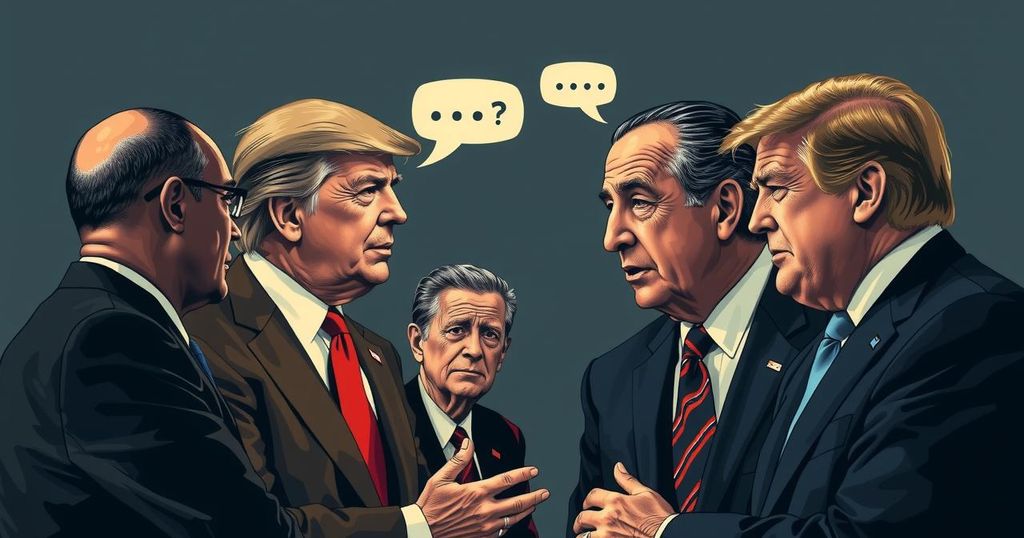Following Donald Trump’s electoral victory, Vladimir Putin’s delayed congratulations and subsequent denials of a conversation regarding the Ukraine conflict indicate a manipulative dynamic aimed at influencing U.S. foreign policy. Public comments from Russian officials suggest expectations for Trump to fulfill obligations in exchange for support, raising concerns about psychological warfare and the potential for political blackmail.
In the immediate aftermath of Donald Trump’s electoral victory, Russian President Vladimir Putin exhibited a deliberate delay in extending his congratulations, heightening intrigue and speculation regarding his influence over Trump. Putin’s congratulatory message came two days later, while Trump received accolades from other world leaders, signaling a potential power dynamic favoring the Kremlin. Furthermore, a Kremlin spokesman denied the existence of a conversation between Putin and Trump concerning the conflict in Ukraine, undermining Trump’s claims and illustrating a dismissive posture from Russia. The situation escalated as Nikolai Patrushev, Russia’s intelligence chief, publicly insinuated that Trump owed obligations to certain forces for his election victory, implying a quid pro quo arrangement. This statement raises concerns over possible manipulation or threats against Trump, suggesting that the Kremlin might expect favors in return for their support. While there is no evidence that Trump or his campaign colluded in the misinformation environment preceding the election, Patrushev’s comments serve as a stark reminder of the potential for psychological warfare and political manipulation. Defensive actions by Russian operatives included disseminating false videos to misrepresent voting behavior in crucial demographics and orchestrating bomb threats against polling locations in predominantly Black neighborhoods. The FBI and other U.S. intelligence agencies have denounced these tactics as Russian interference. Nevertheless, the absence of direct collusion from Trump raises questions about his awareness of these strategies and their implications for American democracy. Trump’s historical perspective on international relations indicates a tendency toward favoring rapprochement with Putin and Russia, particularly as evidenced by his disregard for intelligence community assessments concerning Russian electoral interference in 2016. Moreover, Trump has consistently maligned multinational alliances and has not prioritized military support for Ukraine. The prevailing sentiment within the Republican Party echoes Trump’s inclination to strengthen relations with Russia while diminishing support for NATO and other alliances. As Trump navigates this precarious landscape, the ramifications of Putin’s manipulation could have far-reaching effects on both his presidency and U.S. foreign policy. Observers are left to contemplate the capacity of Trump to recalibrate his approach as he confronts the stark reality of Putin’s strategic interests conflicting with American prerogatives in the region.
The relationship between Donald Trump and Vladimir Putin has been mired in controversy, especially following Russia’s electoral interference in the 2016 U.S. presidential election. Putin, a figure Trump has expressed admiration for, appears to engage in psychological maneuvers to assert influence over the American president, especially during a time when Trump is re-entering the political arena post-election victory. Russia’s strategic interests in Ukraine exemplify the complex web of diplomacy that has characterized their interactions, raising concerns about manipulation and national security.
In summary, Vladimir Putin’s actions following Donald Trump’s election highlight a potential manipulative dynamic that could influence U.S. foreign policy. The Kremlin’s calculated correspondence and public statements reveal an attempt to assert control over Trump, challenging the notion of personal alliances in the face of national interests. As the political landscape evolves, it remains crucial for Trump to recognize the implications of his relationship with Putin and the need for a balanced approach toward international relations.
Original Source: slate.com






